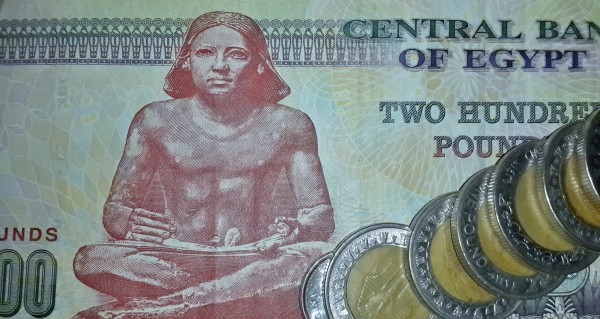Further devaluation looms over the Egyptian pound

BY ENGY ALY
@ENGYALY7
Egypt is continuing to face an uphill battle as its economy grapples with the shortage in foreign currency reserves.
The Central Bank of Egypt (CBE) recently devalued the Egyptian pound against the US dollar twice in one week in an effort to subdue an emerging black market.
On October 11, the CBE devalued the pound by 10 piasters, from EGP 7.73 to 7.83 against the dollar.
Four days later, the bank weakened the pound further, dropping the value from EGP 7.83 to 7.93 per dollar.
The current rate to buy the dollar through the banking system is EGP 8.03, but in the black market it can reach as high as 8.42.
The rapid decline of the national currency forced CBE Governor Hesham Ramiz to resign.
He was replaced with Tarek Amer, “in a move welcomed by traders who expect a new approach that could help ease the country’s currency crisis,” according to Reuters.
Shortage in Foreign Reserves
The CBE is devaluing the Egyptian pound due to a shortage of US dollars exacerbated by a dramatic decline in the tourism sector since 2011.
There is also a decrease in foreign aid from Gulf Cooperation Council (GCC) countries.
Egypt’s foreign reserves fell to $16.4 billion in September, down by more than $1.76 billion from the $18.096 billion recorded in August, according to The Economist.
The tourism sector accounts for 7-11 percent of Egyptian Gross Domestic Product (GDP) and generates about 20 percent of its foreign exchange earning, according to data from the State Information Service (SIS).
This means that its decline directly affects the amount of hard currency in state coffers and its availability in the local market.
Moreover, last year’s decline in oil prices – by as much as 60 percent from 2013 levels – adversely affected the GCC countries’ revenues and subsequently foreign aid to Egypt, which is an important source of dollars.
According to the Suez Canal Authority last week, earnings from the waterway fell by more than $13 million in September, thereby adding pressure on the Central Bank to deal with less dollars in the country.
But the global financial crisis, which has now apparently extended to the Chinese economic juggernaut, is further exacerbating Egypt’s challenges in securing substantial foreign currency reserves.
As the world’s appetite for commodities falls due to slower GDP growth in the Americas, Europe and Asia, maritime trade and transport of goods also falls.
As a result, there is less maritime traffic in open waters and nowhere has this been more noticed than in the Suez Canal, a vital trading waterway.
Consequently, a black market for dollars emerged and now the CBE has been trying to suppress it through devaluation policies.
A Matter of Necessity
Minister of Investment Ashraf Salman said at the Euromoney conference in Egypt on September 7 that the devaluation of the Egyptian pound is no longer a matter of choice.
The CEO of the National Bank of Egypt (NBE) Abbas Mohamed told The Caravan that Egyptians should understand that the forces of supply and demand work with the dollar in the same manner as they work for any commodity.
“The dollar’s demand is gradually increasing, while its supply is decreasing [..] therefore, its [value] has to increase,” Mohamed said.
Deputy General Manager at HSBC Hala El Gammal corroborated Salman’s claims when she told The Caravan that the decision of devaluing the Egyptian pound is in fact vital to stabilizing Egypt’s economy.
“I believe that this is a progressive step and that it could be effective in the short to medium term because the CBE is trying to support the Egyptian economy by increasing inflation and exports,” added El Gammal.
Reviving Local Industries and Tourism
Gammal continued by saying that the decision has restricted access to foreign currency and hindered the ability to pay for imports.
In turn, this creates an opportunity for Egypt to revive its export sector.
Mohamed also added that Egypt’s problematic economy could be saved through three areas of focus: promoting tourism, increasing exported goods, and encouraging the number of Egyptians who work in foreign countries to invest funds back into the country.
“The government should offer factories the necessities needed to ease the process of exporting agricultural goods or other exports that we are good at,” Mohamed continued.
Moreover, Mohamed added that the NBE is now working on increasing the interest of the bank deposits of people who travel for work and bring in foreign currency to the country.
Meanwhile, Samer Atallah, an economics professor at AUC, told The Caravan that he believes that the devaluation of the Egyptian pound is the result of an unsuccessful economy.
“The weakness of the Egyptian pound vis-à-vis the US dollar and hard currencies is a symptom of a weak economy that substantially relies on import and is not capable of producing enough outputs to cover its consumption,” Atallah said.
“As long as this chronic disease continues, the pound will continue to devaluate,” he added.



